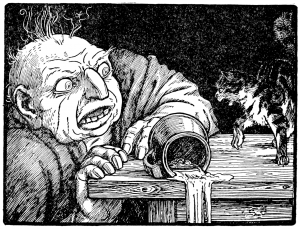Difference between revisions of "Ogres"
Trismegistus (talk | contribs) m |
Trismegistus (talk | contribs) m |
||
| Line 1: | Line 1: | ||
[[File:OgreEuropa'sFairybook1916publicdomain.png|thumb|300px|A somewhat softened depiction of an ogre for a children's books. Real ogres are rather menacing.]] | [[File:OgreEuropa'sFairybook1916publicdomain.png|thumb|300px|A somewhat softened depiction of an ogre for a children's books. Real ogres are rather menacing.]] | ||
| − | Ogres are members of a [[humanlike]] race known for their great size and frame, low intelligence, and readiness for violence. Male Ogres of [[Pytharnia]] are 9'2" (2.80m) tall. They live in small family groups or as individuals in the wilds of the world, due to their characteristic unwillingness to submit to civilization. Ogres have large, indelicate features on their faces, lower fangs, and long, pointed ears. They do not have horns, although myths and legends sometimes depict them with such. Their coloring is somewhat sallow and they tend towards a profusion of hair on their backs. Ogres speak a simplified mixture of whatever language surrounds them. In the woodlands of mid and northern [[Pytharnia]], for example, they speak [[Disdrirn Sylvan]]. Ogres have been virtually extirpated from southern [[Pytharnia]], [[Corundy]], and other places in the civilized world, but their survival is | + | Ogres are members of a [[humanlike]] race known for their great size and frame, low intelligence, and readiness for violence. Male Ogres of [[Pytharnia]] are 9'2" (2.80m) tall. They live in small family groups or as individuals in the wilds of the world, due to their characteristic unwillingness to submit to civilization. Ogres have large, indelicate features on their faces, lower fangs, and long, pointed ears. They do not have horns, although myths and legends sometimes depict them with such. Their coloring is somewhat sallow and they tend towards a profusion of hair on their backs. Ogres speak a simplified mixture of whatever language surrounds them. In the woodlands of mid and northern [[Pytharnia]], for example, they speak [[Disdrirn Sylvan]]. Ogres have been virtually extirpated from southern [[Pytharnia]], [[Corundy]], and other places in the civilized world, but their survival is nearly assured as they are opportunistic hunter-gatherers and despite their violent tendencies can avoid humans and other civilized races when they understand they cannot win the fight. |
Ogres are common in folk tales and children's stories. They are rarely encountered by most people, save those traveling through dense woodlands and other wilderness places. | Ogres are common in folk tales and children's stories. They are rarely encountered by most people, save those traveling through dense woodlands and other wilderness places. | ||
Latest revision as of 08:37, 30 December 2014
Ogres are members of a humanlike race known for their great size and frame, low intelligence, and readiness for violence. Male Ogres of Pytharnia are 9'2" (2.80m) tall. They live in small family groups or as individuals in the wilds of the world, due to their characteristic unwillingness to submit to civilization. Ogres have large, indelicate features on their faces, lower fangs, and long, pointed ears. They do not have horns, although myths and legends sometimes depict them with such. Their coloring is somewhat sallow and they tend towards a profusion of hair on their backs. Ogres speak a simplified mixture of whatever language surrounds them. In the woodlands of mid and northern Pytharnia, for example, they speak Disdrirn Sylvan. Ogres have been virtually extirpated from southern Pytharnia, Corundy, and other places in the civilized world, but their survival is nearly assured as they are opportunistic hunter-gatherers and despite their violent tendencies can avoid humans and other civilized races when they understand they cannot win the fight.
Ogres are common in folk tales and children's stories. They are rarely encountered by most people, save those traveling through dense woodlands and other wilderness places.
See Also
| This article is a stub. It requires further development by the creator. |
